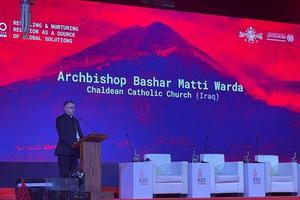G20 Religion Forum Gathers Ahead of Summit in Bali, Indonesia
Called the R20 for short, this year’s inaugural Religion Forum is set to reconvene with next year’s G20 in India and then the following year in Brazil.

The catholicism of Catholicism is what makes our faith so vital today. For too long, conversations about religion have forced the faithful to choose between commitments that should not be seen as separate. We can worship God and cherish the environment. We can worship God and look after the less fortunate. Last week in Bahrain, Pope Francis reiterated these commitments. Catholics will be pleased to know that not only was he warmly received, but many of our moral commitments have increasingly broad support.
In a matter of days, the world’s most powerful leaders will gather in Bali for the annual G20. The Indonesian Island of Bali is hosting the 20 largest economies in the world as they struggle to contain the aftermath of the COVID-19 pandemic, address tremendous economic uncertainty and debate how to work together in an era of increasing suspicion and outright hostility. Probably religion will not be high on their agenda — at least not the kind of religion we preach.
For some leaders, religion is at most an afterthought. For others, it is a purely personal matter. And for some, sadly, it’s a weapon used to divide their populations and conquer their political systems. (That, for example, is the case in India, where a Hindu party has become increasingly aggressive toward Muslim and Christian minorities.) But maybe this is because their understanding of religion limits and in fact denigrates faith. It is a tool they wield, as opposed to a process they submit to. Not a practice of refinement, but a means of self-satisfaction.
In that regard, the Vatican’s authority often confounds world leaders, who cannot understand how to relate to a Church that engages the world, works with the world, but refuses to limit itself to the world. If we are honest, Catholics have also been harmed by this fact — our Church is sometimes dismissed and sometimes even viewed as a threat. Which is why what happened in Bali ahead of the summit is so exciting. As part of the G20, but unfolding days before world leaders arrive, this year’s gathering included the first-ever Religion Forum on Nov. 2-3.
Called the R20 for short, this inaugural Religion Forum is set to reconvene with next year’s G20 in India and then the following year in Brazil.
This year’s R20 that took place in Indonesia has additional significance. Indonesia is of course the world’s largest Muslim-majority country. It is also a secular democracy; while its democratic record is more recent, its commitment to secularism dates to its founding, after independence from the Dutch following World War II. Would it surprise Catholic readers to know that this commitment to secularism has long been supported by some of the most faithful Muslims in the country, including its largest religious organization?
Called Nahdlatul Ulama, or NU, this group led by senior Indonesian clerics counts tens of millions of Indonesians as members. For the R20, it has partnered with the Muslim World League, the Islamic world’s largest non-governmental organization. The Muslim World League is headed by a senior Saudi Arabian Scholar, Dr. Abdul Karim Al-Issa, and is based in his native Saudi Arabia. That location gives it tremendous influence among Muslim communities around the world. What it is doing with that influence is remarkable.
The Muslim World League has become an increasingly resolute advocate for moderation, pluralism and tolerance — including in the cause of religious freedom. Neither group wants narrow religious edicts to be enforced upon diverse populations, and both groups are more than willing to commit to that in public fora. Their dedication to the R20, which has attracted senior faith leaders from all the world’s great traditions, exemplifies this promising trend in Muslim religiosity, a sharp move away from the headlines of recent years.
That doesn’t mean there aren’t forces in Muslim (and other religious) communities that advocate for an extreme imposition of faith. It does however mean that huge Muslim bodies with unparalleled authority and reach are fighting back; by connecting themselves to the G20, they not only find willing partners in other powerful countries, but they are likely to reach political leaders and provide a different template for what religion is — and how faith and government can work together without collapsing into each other.
Dr. Al-Issa opened the R20 with an exhortation: He noted that many of the world’s biggest challenges have moral causes and require spiritual solutions. Not religion as harsh imposition, but faith as true conviction, which acts in the world with purpose and compassion. To that end, he even announced that the Muslim World League is creating a humanitarian fund to help victims of war in Ukraine. With that country likely to face a trying winter, this gesture of interfaith solidarity is urgent. And inspiring.
For Catholics, the opportunity to work with faith leaders with similar priorities and common commitments is exciting. It means our dedication to religion, to social development and to stewardship of the Earth is not one we make alone. And that is something all the world should heed. For Dr. Al-Issa is right: Behind many of our earthly problems are spiritual problems. We cannot solve the former without a deeper consciousness of who we are, where we came from and where we are going.
Uchenna Ekwo is a Nigerian-born author and media studies scholar affiliated with The City University of New York, and a member of the Knights of Columbus.
- Keywords:
- g20 summit
- indonesia
- interreligious dialogue
















